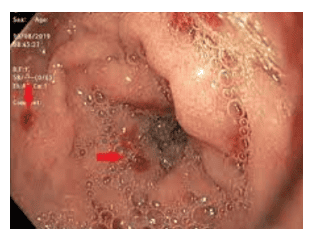This is an automatically translated article.
Pylobact contains the main ingredients are Omeprazole, Clarithromycin and Tinidazole, a box of Pylobact has 7 sets of drugs corresponding to 7 days of therapy. This form creates favorable conditions for patients to easily adhere to the regimen of eradicating H. pylori bacteria in peptic ulcer disease.
1. What is the effect of Pylobact?
Pylobact medicine contains the following ingredients and effects:
Omeprazole 20mg works to prevent gastric acid secretion by inhibiting the proton pump H + / K + ATPase at the secretory surface of gastric parietal cells, reducing The amount of acid in the stomach, reduces symptoms such as heartburn, difficulty swallowing, prolonged cough and is often used in the treatment of gastroesophageal reflux disease and benign peptic ulcers. Tinidazole 500mg is a substance of the Nitroimidazole group with bactericidal effect against anaerobic bacteria, protozoa and H. pylori bacteria. Clarithromycin 250mg is an antibiotic belonging to the Macrolide group, has bactericidal effect against many aerobic and anaerobic Gram (+), Gram (-), including H. pylori. In the treatment regimens for H.pylori bacteria, the 3-drug formula with Omeprazole, Clarithromycin and Tinidazole gives the best results. For clinical trials it has been shown that this triple therapy is ideal because the clearance rate for H. pylori is very high (up to 90-100%).
2. Indications of the drug Pylobacter
Pylobact is indicated in the following cases:
Chronic benign gastritis with H.pylori infection. Peptic ulcer - duodenum infection with H.pylori.
3. Contraindications of Pylobact
Pylobact is contraindicated in the following cases:
Patients with hypersensitivity to Omeprazole, Clarithromycin or Tinidazole or any of the excipients of the drug. Patients with hypersensitivity to other Benzimidazole derivatives (e.g. Lansoprazole, Pantoprazol, Rabeprazole). Patients with disorders of hematopoiesis.
4. Dosage and how to use Pylobact
Pylobact is produced in the form of a drug set with each set containing 2 Omeprazole capsules, 2 Tinidazole tablets and 2 Clarithromycin tablets. 1 box has 7 sets, each set for 1 day of treatment and 1 box of medicine for 7 days, for oral use.With this special packaging form, in 1 day the patient will take 1 Omeprazole capsule, 1 Clarithromycin tablet and 1 Tinidazole tablet in the morning and take another similar dose in the afternoon or evening.
After 7 days of treatment with Pylobact, the patient continues treatment: Omeprazole 20mg / time x 2 times / day or Lansoprazole 30mg / time x 1 time / day for the next 3 weeks.
5. Undesirable effects of Pylobact
When patients use Pylobact, they may experience unwanted side effects as follows:
Common side effects are as follows:
Nervous system: Drowsiness, dizziness, headache. Digestive system: Nausea, vomiting, abdominal pain, diarrhea, constipation, abdominal distension. Less common side effects are as follows:
Nervous system: Insomnia, confusion, dizziness, fatigue. On the skin: Urticaria, itching, rash. Hepatic: Elevated liver enzymes, however liver enzymes may return to normal after discontinuation of the drug. Rare side effects are as follows:
Body and skin: Sweating, peripheral edema, hypersensitivity (angioedema, fever and anaphylaxis). Blood and lymphatic system: Leukopenia, platelets, whole blood cells, agranulocytosis. Nervous system and mental: Reversible confusion, agitation, depression, hallucinations in elderly patients and especially in critically ill patients, hearing disorders. Digestive system: Gastritis, Candida infection, dry mouth, jaundice or non-jaundice hepatitis, encephalopathy in liver failure. Respiratory system: Bronchospasm. Musculoskeletal system: Joint pain, muscle pain. Renal - urinary system: Interstitial nephritis.
6. Precautions when using Pylobact
Patients using Pylobact should note the following information:
Patients using Pylobact should not drink alcoholic beverages because Pylobact can cause disulfiram-like interactions with alcohol. Pylobacter should be used with caution in patients with severe hepatic or renal impairment. Treatment with proton pump inhibitors and antibiotics, including Pylobact, may increase the risk of gastrointestinal infections with strains such as Salmonella, Campylobacter and Clostridium difficile. Patients should be excluded from pseudomembranous colitis when using Pylobacter. Pylobacter should not be used in patients with organic neurological disorders. The possibility that the patient has a gastrointestinal malignancy must be excluded prior to treatment with Pylobact because of the possible masking of the disease. Pylobact should not be used in patients being treated with terfenadine or astemizole, concomitant use may increase blood levels of these drugs, which may prolong cardiac QT interval and cause cardiac arrest. cardiac arrhythmia. Note to pregnant women: Do not use Pylobact for pregnant and lactating women, especially in the first 3 months of pregnancy. Caution for nursing women: Pylobact is not recommended for use in nursing mothers. Therefore, nursing mothers should decide whether to discontinue use of Pylobact or to discontinue breast-feeding during use. Note when driving and operating machines: Due to the side effects that can cause dizziness and fatigue, Pylobact affects alertness in patients, it is recommended that when taking the drug, do not drive or operate machinery. or do tasks that require alertness.
7. Interactions of Pylobacter
When using Pylobact, patients should note some of the following interactions:
Theophyllin: Concomitant use with Pylobact will increase Theophylline concentration. Terfenadine: Concomitant use with Pylobact will increase the concentration of Terfenadine, which will prolong the QT interval or cause cardiac arrhythmias. Oral Anticoagulants: Concomitant use with Pylobacter may potentiate the effects of oral anticoagulants such as Warfarin. Therefore, it is necessary to do a test to monitor the patient's prothrombin time. Carbamazepine, Cyclosporine, Phenytoin, Disopyramide, Lovastatin, Valproate, Cisapride, Pimozide, Astemizole, Digoxin: Concentrations of these drugs may be increased when co-administered with Pylobact. Ketoconazole, Ampicillin and Iron Salts: Due to its strong acid suppression properties, Pylobact may interfere with the absorption of these drugs. Phenytoin, Diazepam, Warfarin: Pylobact delays the excretion of this drug. Above is the information about the drug Pylobacter, patients need to carefully read the instructions for use, consult a doctor / pharmacist before using. Note, Pylobacter is a prescription drug, patients need to use the drug as prescribed by the doctor, absolutely do not self-treat or infuse drugs at home.













